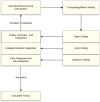Barriers and facilitators of adherence to antiretroviral drug therapy and retention in care among adult HIV-positive patients: a qualitative study from Ethiopia
- PMID: 24828585
- PMCID: PMC4020856
- DOI: 10.1371/journal.pone.0097353
Barriers and facilitators of adherence to antiretroviral drug therapy and retention in care among adult HIV-positive patients: a qualitative study from Ethiopia
Abstract
Background: Antiretroviral therapy (ART) has been life saving for hundreds of thousands of Ethiopians. With increased availability of ART in recent years, achievement of optimal adherence and patient retention are becoming the greatest challenges in the management of HIV/AIDS in Ethiopia. However, few studies have explored factors influencing medication adherence to ART and retention in follow-up care among adult Ethiopian HIV-positive patients, especially in the Amhara region of the country, where almost one-third of the country's ART is prescribed. The aim of this qualitative study was to collect such data from patients and healthcare providers in the Amhara region of Ethiopia.
Methods: Semi-structured interviews were conducted with 24 patients, of whom 11 had been lost to follow-up and were non-persistent with ART. In addition, focus group discussions were performed with 15 ART nurses and 19 case managers. All interviews and focus groups were audio-recorded, transcribed, and coded for themes and patterns in Amharic using a grounded theory approach. The emergent concepts and categories were translated into English.
Results: Economic constraints, perceived stigma and discrimination, fasting, holy water, medication side effects, and dissatisfaction with healthcare services were major reasons for patients being non-adherent and lost to follow-up. Disclosure of HIV status, social support, use of reminder aids, responsibility for raising children, improved health on ART, and receiving education and counseling emerged as facilitators of adherence to ART.
Conclusions: Improving adherence and retention requires integration of enhanced treatment access with improved job and food security. Healthcare providers need to be supported to better equip patients to cope with the issues associated with ART. Development of social policies and cooperation between various agencies are required to facilitate optimal adherence to ART, patient retention, and improved patient outcomes.
Conflict of interest statement
Figures
References
-
- Ethiopian Federal Ministry of Health HIV/AIDS Prevention and Control office (HAPCO) (2012) Country progress report in HIV/AIDS response. Addis Ababa: Ethiopian Federal Ministry of Health HIV/AIDS Prevention and Control office.
-
- Cramer JA, Roy A, Burrell A, Fairchild CJ, Fuldeore MJ, et al. (2008) Medication compliance and persistence: terminology and definitions. Value Health 11: 44–47. - PubMed
-
- Kobin AB, Sheth NU (2011) Levels of adherence required for virologic suppression among newer antiretroviral medications. Ann Pharmacother 45: 372–379. - PubMed
-
- Paterson DL, Swindells S, Mohr J, Brester M, Vergis EN, et al. (2000) Adherence to protease inhibitor therapy and outcomes in patients with HIV infection. Ann Intern Med 133: 21–30. - PubMed
Publication types
MeSH terms
Substances
LinkOut - more resources
Full Text Sources
Other Literature Sources
Medical


